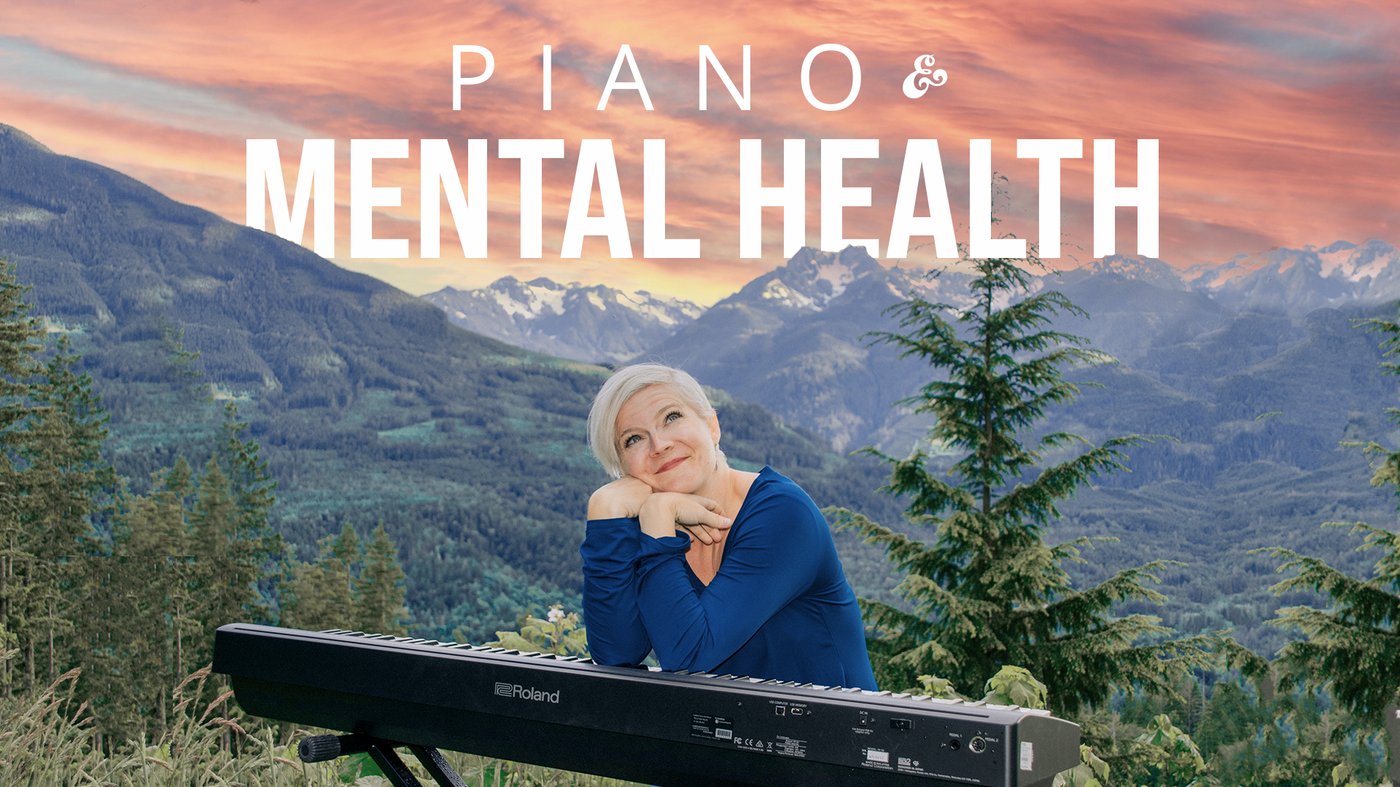
If you love music, you understand the healing effect it holds. Music and mental health are so connected. Songs have a way of soothing us when other things can’t, and playing music expresses challenging emotions that words can’t.
But if you’re not a musician, can you still benefit from the positive effects of playing music? Absolutely! Keep reading to learn more about the positive benefits of music and ways complete beginners can use music to ease stress. No music experience required!
Subscribe to The Note for exclusive interviews, fascinating articles, and inspiring lessons delivered straight to your inbox. Unsubscribe at any time.

People who listen to music to de-stress don’t need a study to prove this, but it’s still nice to know that science backs this up. A 2013 meta-analysis of 400 studies confirmed that music both relieves stress and improves immune function. The body produces less cortisol (stress hormone) and more immunoglobulin A and killer T cells when in the presence of music.
Now this is a win for piano! In one study, college students’ cortisol levels were measured before and after doing artistic activities. The activities were playing piano, sculpture, and calligraphy. All subjects had some experience with their assigned activity, but none were professionals. A control group sat in silence.
Remarkably, the piano playing group experienced far larger drops in cortisol levels than the sculpture and calligraphy groups. So there is definitely something powerful about playing a musical instrument.
Mindfulness is a popular and effective practice. It means paying attention to the present moment, without judgement. The good thing about mindfulness is that you don’t need to sit in the lotus position and do nothing. You can practice mindfulness through walking, eating, and of course, piano playing!
When you play music, pay attention to the sensations in your body. If you notice you’re holding stress in an area, try to let it go. Focus on the nuances of each note you play: dynamics, articulation, phrasing, and so on.
Mental and physical health are connected, and chronic pain can really diminish a person’s quality of life. Studies suggest that music may have a small but significant effect on reducing pain. A theory is that music stimulates a person’s senses other than pain, thereby drawing attention away from the pain.
Good sleep is essential to both physical and mental health. Studies suggest that music helps people fall asleep and improves quality of sleep. Again, this may be tied to cortisol: decreasing cortisol through music may make it easier to fall asleep.
However, other studies have found that listening to music right before bed can give you earworms (when a song gets stuck in your head) and lead to poorer sleep quality. So, along with everything else on this list, do what works for you.
In one study, older adults were sorted into two groups. One group received weekly, hour-long piano lessons for six months and practiced for 30 minutes a day. The other group attended lessons on music history, culture, and appreciation. At the end of the six months, the fornix (a white matter tract in the brain) of the second group’s participants declined. But the group that got piano lessons did not experience the same effect.
The fornix is associated with memory and naturally declines with age. Learning to play an instrument may be a powerful defence against cognitive decline and even dementia.
Music therapy has been around for a long time. In fact, it was first recognized by the United States War Department in 1945. The benefits of music have been studied for a while and there are now several different types and techniques.
When combined with conventional treatments, music therapy has been shown to effectively treat symptoms of depression and obsessive-compulsive disorder. And no, you don’t have to be a skilled musician to benefit from music therapy!

You don’t need to know how to read music or even what notes are to do this exercise. So long as you can physically press down keys on a keyboard, you can create beautiful music! And we’ll tell you exactly which keys to play. By the end of this exercise, you’ll be able to play a three-note pattern with your right hand and several bass note accompaniments with your left.
This exercise introduces you to basic improvisation. And it’s super simple. Again, no experience is required and we’ll tell you exactly which keys to play. You’ll learn that because we’re in the key of C Major, any of the white keys are fair game. There are no wrong notes to worry about. Yay!
These little pieces are perfect for people who are just learning how to read music. But, again, knowing how to read is not mandatory because we’ll explain each melody in detail. For those who want to dive deeper, Lisa will introduce some fundamental theory concepts as well. (They’re not too complicated—we promise!)
If you can play chords, you can play songs. There’s a common misunderstanding that beginner piano students are only allowed to play “Mary Had a Little Lamb.” But you can play basic versions of your favorite songs on the radio with just a few core concepts. Once you master the four most popular chords, you’ve unlocked hundreds of pop songs.
We hope these lessons inspire you on your journey to mental wellness! Everyone feels down, anxious, or stressed sometimes. Don’t be afraid to ask for help; it’s a sign of strength, not weakness. Here are some mental health resources if you need them:
Subscribe to The Note for exclusive interviews, fascinating articles, and inspiring lessons delivered straight to your inbox. Unsubscribe at any time.
Charmaine Li is a Vancouver writer who has played piano for over 20 years. She holds an Associate diploma (ARCT) from the Royal Conservatory of Music and loves writing about the ways in which music—and music learning—affects the human experience. Charmaine manages The Note. Learn more about Charmaine here.
/marketing/pianote/promos/april/banner-bg-m.webp)
We use cookies for traffic data and advertising. Cookie Policy »
/marketing/pianote/promos/april/banner-title.webp)